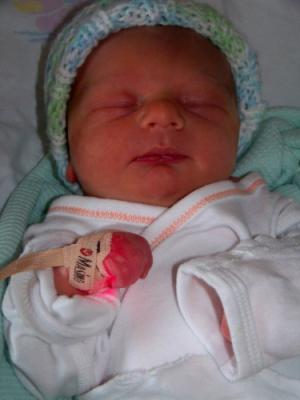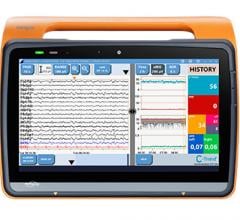
February 25, 2013 — The American Heart Association (AHA) is focusing its advocacy efforts across the Midwest on the use of pulse oximetry screening (pulse ox) to detect congenital heart defects in newborns.
"Pulse ox screening is non-invasive, inexpensive and can potentially save a child's life," said Maureen Cassidy, vice president of Advocacy for the American Heart Association's Midwest Affiliate. "In fact, new research suggests that wider use of pulse ox would help identify more than 90 percent of heart defects."
The test consists of sensors placed on a newborn's hand and foot to check blood oxygen levels. If levels are too low, additional tests may be conducted that aid in detecting critical or possibly life-threatening heart defects that might otherwise go undetected.
In September 2011, U.S. Secretary of Health and Human Services Kathleen Sebelius advised that critical congenital heart defects screening be added to the "Recommended Uniform Screening Panel" for newborns before they are released from a hospital or birthing facility. As a result, several states including New Jersey, Maryland, Indiana, Tennessee and West Virginia have already passed laws requiring newborns to have pulse ox screenings prior to being discharged from the hospital.
Ongoing advocacy efforts across the Midwest include:
- Illinois – The AHA is working with volunteers, partner organizations and the Department of Public Health to pass pulse ox legislation.
- Indiana – In spring 2011, the Indiana legislature added pulse ox to the state's newborn screening and all birthing facilities in Indiana are now required to perform this screening.
- Iowa – Legislation has been introduced to require all hospitals to administer pulse ox screening to every newborn. The AHA continues to work with the Iowa Health Department to add this test to the screening panel.
- Kansas – The AHA is working with the Kansas Newborn Screening Advisory Council to recommend that pulse ox screening be added to the list of tests conducted on all Kansasnewborns prior to discharge. The formal recommendation is expected later this spring.
- Michigan – The AHA is supporting the Michigan Dept. of Community Health in coordinating a pilot study to establish best practices in pulse ox screening for the state. Educational materials can be found at www.michigan.gov/cchd.
- Minnesota – The state introduced legislation this February to make pulse ox screening required for all newborns before hospital discharge.
- Missouri – Chloe's Law (Senate Bill 230/House Bill 274) has been introduced and would require all birthing facilities in Missouri to screen newborns using pulse ox. Both bills are scheduled to be heard in committee and could be discussed on the floor of each chamber as early as March.
- Nebraska – The AHA is working with volunteers and partner organizations to pass screenings for all newborns in Nebraska. The bill passed an initial vote of 40-0 and must now continue through the legislature.
- North Dakota – A North Dakota bill has passed the Senate by a 47 – 0 vote after a unanimous "Do Pass" recommendation by the Senate Human Services committee.
- Ohio – The "Newborn Healthy Hearts Bill" (Senate Bill 4) has been introduced to include pulse oximetry screening to the newborn screening panel. The bill is a senate top 10 priority.
- South Dakota – Senate Bill 168 (SB168) to require pulse ox screening for newborns is currently moving through the South Dakota Legislature, gaining broad, bipartisan support.
- Wisconsin – Legislation with strong, bi-partisan support and a broad group of stakeholder support was circulated in early February and is expected to be introduced in early March.
To learn more about the efforts to increase pulse ox screening among newborns, visit www.heart.org/midwestpulseox


 October 21, 2025
October 21, 2025 









